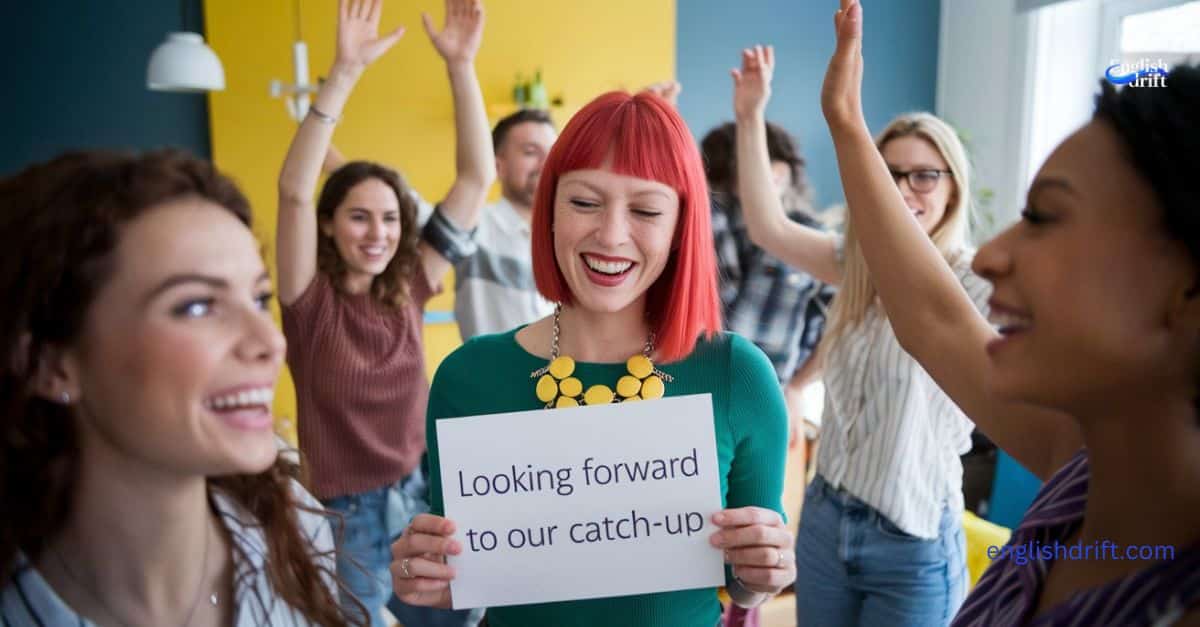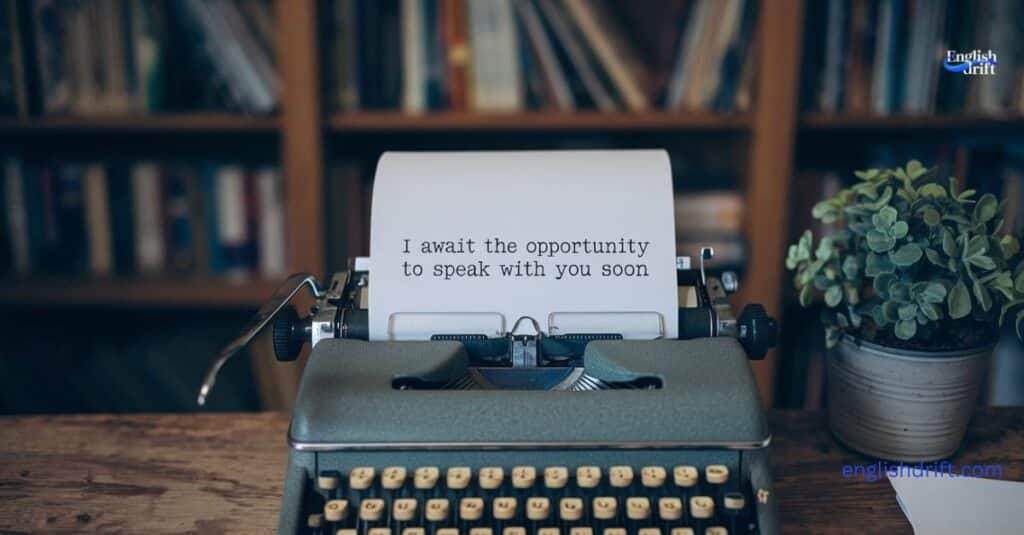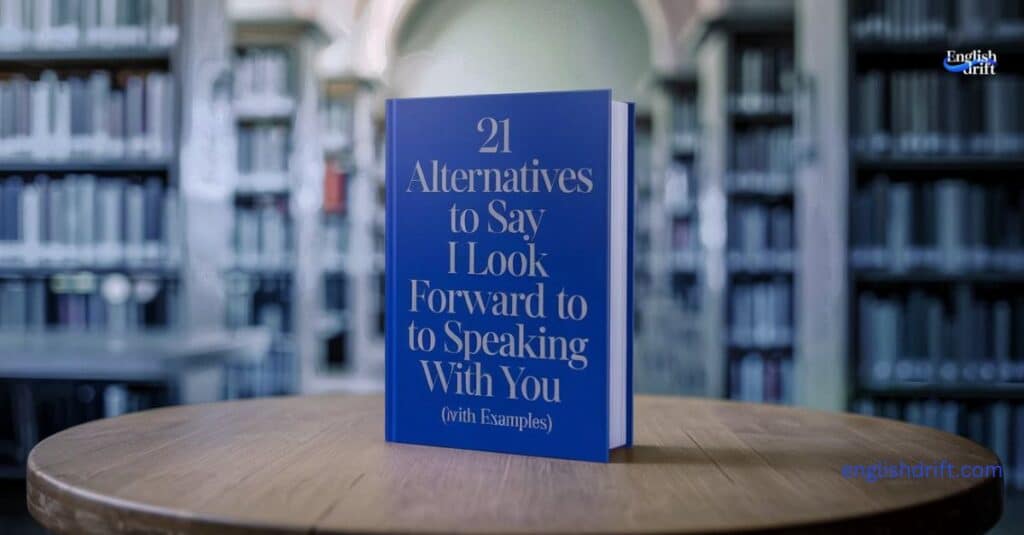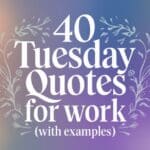Communication in professional settings often calls for versatility, especially when closing an email or message. The phrase “I look forward to speaking with you” has been overused, and while it gets the job done, there are more engaging, creative, and contextual alternatives that can be used depending on the scenario.
Whether you’re wrapping up a note for a collaborative project, sending a personal message, or preparing for a joint presentation, choosing the right words makes a significant impact.
In this blog post, we’ll walk through 21 alternative ways to say “I look forward to speaking with you,” each tailored for different settings, tones, and contexts. From casual to formal, these alternatives can add depth and personalization to your communication while maintaining a conversational tone that resonates with your recipient.
Let’s dive into some thoughtful and practical substitutes for one of the most common phrases used in business communication.
Read More 20 Other Ways to Say “Meet and Greet” (With Examples)
Why Look for Alternatives to “I Look Forward to Speaking With You”?
In many professional settings, expressing enthusiasm for a future interaction is important. Yet, using the same phrase repeatedly—especially something as formal as “I look forward to speaking with you”—can make your message sound stale and uninspired.
Here’s why you should consider alternatives:
- Tone and context: Every communication is different. A casual email to a colleague might warrant a more relaxed closing, while a formal memo for a business context needs something more polished.
- Personalization: Tailoring your message to the recipient strengthens relationships, whether in a mentoring relationship or a collaborative project.
- Creativity: Fresh language keeps conversations engaging, showing that you’re invested and thoughtful about your communication.
By considering alternative ways to express the same sentiment, you can ensure your message stays dynamic and engaging.
Read More 19 Other Ways to Say “Looking Forward to Seeing You” (With Examples)
21 Alternatives to Say “I Look Forward to Speaking With You”
Casual ways of I Look Forward to Speaking With You
- I Can’t Wait to Catch Up With You Soon
- Excited to Chat Soon!
- Can’t Wait to Connect!
- Looking Forward to Our Catch-Up
- I’m Excited to Speak With You Soon!
Professional Alternatives of I Look Forward to Speaking With You
- Looking Forward to Our Conversation
- I’m Eager to Discuss This With You
- Can’t Wait to Go Over This Together
- I Anticipate a Productive Discussion
- I’m Keen to Talk Through the Details
Formal Alternatives of I Look Forward to Speaking With You
- I Await Our Discussion With Great Interest
- I Anticipate Our Forthcoming Conversation
- I’m Eager to Engage in Our Scheduled Discussion
- I Look Forward to Our Forthcoming Dialogue
- I Await the Opportunity to Speak With You Soon
Respectful Alternatives of I Look Forward to Speaking With You
- I Value Your Time and Look Forward to Our Conversation
- I Look Forward to Hearing Your Insights
- I Look Forward to Learning From Our Conversation
- I Appreciate Your Time and Am Eager to Speak Soon
- I’m Looking Forward to Our Next Steps Together
- I’m Looking Forward to Our Next Steps Together
Casual Alternatives to “I Look Forward to Speaking With You”
In less formal environments where you have a friendly rapport with the recipient, a casual and friendly tone is essential. Here are a few examples that fit these settings.
1. I Can’t Wait to Catch Up With You Soon
This phrase conveys enthusiasm in a laid-back way, suitable for informal settings.
- Tone: Friendly and enthusiastic.
- Example: “I can’t wait to catch up with you soon to discuss the new updates.”
- When to Use: When emailing a colleague or friend you already have a rapport with. This is great for a creative project or personal message.
2. Excited to Chat Soon!
Simple and upbeat, this is perfect for messages that are quick and casual.
- Tone: Casual and cheerful.
- Example: “Excited to chat soon and share our progress.”
- When to Use: Ideal for informal internal team updates or check-ins during cooperative work.
3. Can’t Wait to Connect!
This brief, snappy phrase works well in text messages or quick emails.
- Tone: Brief and informal.
- Example: “Can’t wait to connect later today!”
- When to Use: Best used when you’re planning to discuss innovative tasks or other teamwork initiatives.
4. Looking Forward to Our Catch-Up
While still casual, this alternative leans more professional than the previous options.
- Tone: Friendly but professional.
- Example: “Looking forward to our catch-up next Tuesday to finalize the agenda.”
- When to Use: Great for informal yet professional communications in a business context.

5. I’m Excited to Speak With You Soon!
This adds a personal touch to your enthusiasm.
- Tone: Lighthearted and approachable.
- Example: “I’m excited to speak with you soon about the new design ideas.”
- When to Use: This can be used for emails regarding UI design or other inventive plans.
Professional Alternatives to “I Look Forward to Speaking With You”
When operating in a business context or other formal environments, you want your words to reflect a professional tone. These alternatives are perfect for formal or neutral scenarios.
6. Looking Forward to Our Conversation
This straightforward alternative retains professionalism without being overly formal.
- Tone: Professional and neutral.
- Example: “Looking forward to our conversation this Friday.”
- When to Use: Use this in any professional email or message, especially for a future talk in office scenarios.
Read More 17 equivalent phrases for “Happy Monday” (With Examples)
7. I’m Eager to Discuss This With You
This phrase conveys enthusiasm and shows that you are keen to get into the details.
- Tone: Motivated and solution-focused.
- Example: “I’m eager to discuss this with you and explore the next steps.”
- When to Use: Perfect for project discussions, especially in joint effort projects.
8. Can’t Wait to Go Over This Together
Slightly more casual, but still appropriate for professional settings, this option is great when you’re wrapping up project-related messages.
- Tone: Casual yet professional.
- Example: “Can’t wait to go over this together and map out our next steps.”
- When to Use: This works well for conversations around cooperative work or innovative tasks.

9. I Anticipate a Productive Discussion
A bit more formal, this alternative implies that the upcoming meeting will be productive and insightful.
- Tone: Formal and engaging.
- Example: “I anticipate a productive discussion regarding the merger.”
- When to Use: Use this when you’re addressing a forthcoming conversation in a formal environment.
10. I’m Keen to Talk Through the Details
Expressing that you’re eager and engaged, this phrase is professional yet approachable.
- Tone: Inquisitive and engaged.
- Example: “I’m keen to talk through the details with you next week.”
- When to Use: Great for meetings that involve problem-solving or teamwork initiatives.
Formal Alternatives to “I Look Forward to Speaking With You”
When writing in a highly formal tone, such as in a formal environment, you need to use polished alternatives. These options ensure that you maintain professionalism while showing anticipation.
Read More 20 Other Ways to Say “Looking Forward to Meeting You” (With Examples)
11. I Await Our Discussion With Great Interest
This option is highly formal and polite.
- Tone: Formal and polite.
- Example: “I await our discussion with great interest and look forward to your insights.”
- When to Use: Use this for high-stakes meetings or important cooperative work projects.
12. I Anticipate Our Forthcoming Conversation
This alternative maintains a formal tone and signals readiness.
- Tone: Formal and expectant.
- Example: “I anticipate our forthcoming conversation regarding the proposal.”
- When to Use: Suitable for formal environments or business contexts.
13. I’m Eager to Engage in Our Scheduled Discussion
Another formal option, this phrase conveys your commitment to the scheduled talk.
- Tone: Formal and respectful.
- Example: “I’m eager to engage in our scheduled discussion about the partnership.”
- When to Use: Use this in emails where a joint presentation or similar formal event is being planned.
14. I Look Forward to Our Forthcoming Dialogue
This is another polished and formal way to express anticipation.
- Tone: Formal and anticipatory.
- Example: “I look forward to our forthcoming dialogue and the decisions we will make.”
- When to Use: Ideal for ongoing business contexts or high-level office scenarios.
Read More 20 Other Ways to Say “Strong Work Ethic” (with Examples)
15. I Await the Opportunity to Speak With You Soon
This alternative signals patience and respect.
- Tone: Formal and respectful.
- Example: “I await the opportunity to speak with you soon and explore our potential partnership.”
- When to Use: Great for emails that involve joint effort projects or mentoring relationships.

Respectful Alternatives to “I Look Forward to Speaking With You”
In some situations, showing respect is essential, especially when corresponding with senior colleagues, mentors, or clients. These phrases emphasize your appreciation and readiness.
16. I Value Your Time and Look Forward to Our Conversation
This phrase conveys that you recognize the other person’s time as valuable, and you’re looking forward to the conversation.
- Tone: Respectful and appreciative.
- Example: “I value your time and look forward to our conversation about the upcoming project.”
- When to Use: Use this in communications where the other person’s time is a critical factor, such as during a business context or formal environment.
17. I Look Forward to Hearing Your Insights
This alternative shows that you’re anticipating useful input from the other party.
- Tone: Professional and respectful.
- Example: “I look forward to hearing your insights during the meeting.”
- When to Use: Perfect for meetings involving feedback or mentoring relationships.
18. I’m Looking Forward to Your Guidance
A more deferential option, this phrase shows that you’re looking for help or mentorship.
- Tone: Respectful and deferential.
- Example: “I’m looking forward to your guidance as we navigate these decisions.”
- When to Use: Use this for a mentoring relationship or when seeking expert advice in a **coaching bond**.
19. I Look Forward to Learning From Our Conversation
This shows that you are approaching the conversation with humility and a willingness to learn.
- Tone: Humble and open.
- Example: “I look forward to learning from our conversation and applying your advice to the project.”
- When to Use: Use in mentoring relationships or when you’re receiving expert guidance.
20. I Appreciate Your Time and Am Eager to Speak Soon
A respectful and courteous way to end an email, this is particularly useful when sending a follow-up.
- Tone: Respectful and polite.
- Example: “I appreciate your time and am eager to speak soon about the upcoming project.”
- When to Use: Use this for follow-up emails, especially when planning the next meeting in formal environments.
21. I’m Looking Forward to Our Next Steps Together
This phrase is collaborative and forward-thinking, indicating that you’re ready to work together on upcoming actions.
- Tone: Collaborative and professional.
- Example: “I’m looking forward to our next steps together on the project.”
- When to Use: Best for emails that involve teamwork initiatives or cooperative work like a joint presentation.

Final Tips for Choosing the Right Phrase
- Match the tone: Always align the tone of your message with the nature of the relationship or the importance of the topic.
- Avoid repetition: Switch up your phrases to keep the conversation engaging and avoid sounding robotic.
- Personalize: Make sure that the message reflects your enthusiasm or appreciation for the recipient’s time.
By using these 21 alternatives, you’ll avoid the monotony of “I look forward to speaking with you” and leave a better impression in your business context, personal messages, or mentoring relationships.

Henry James is an experienced blogger at English Drift, specializing in English grammar and vocabulary. With a passion for language and clear communication, Henry helps readers enhance their writing skills through insightful guides and practical tips.







